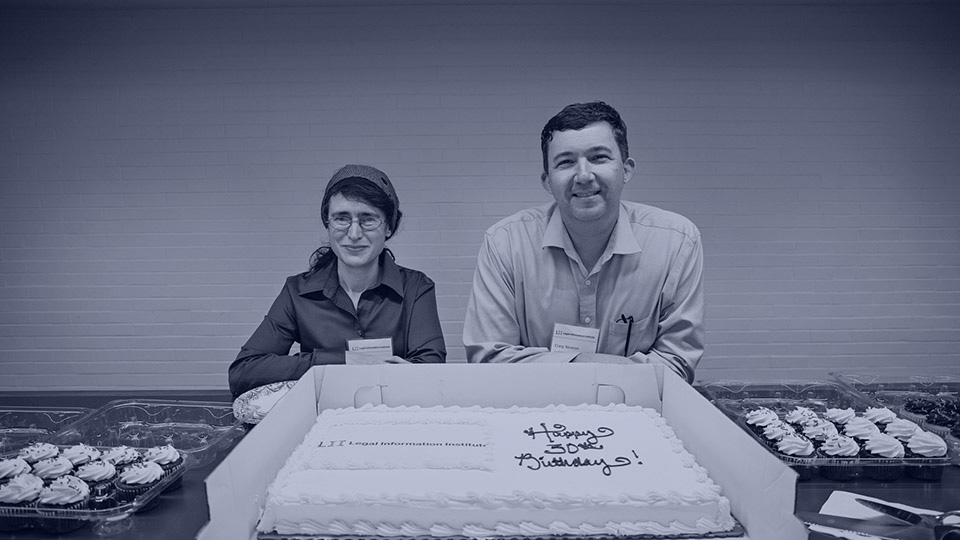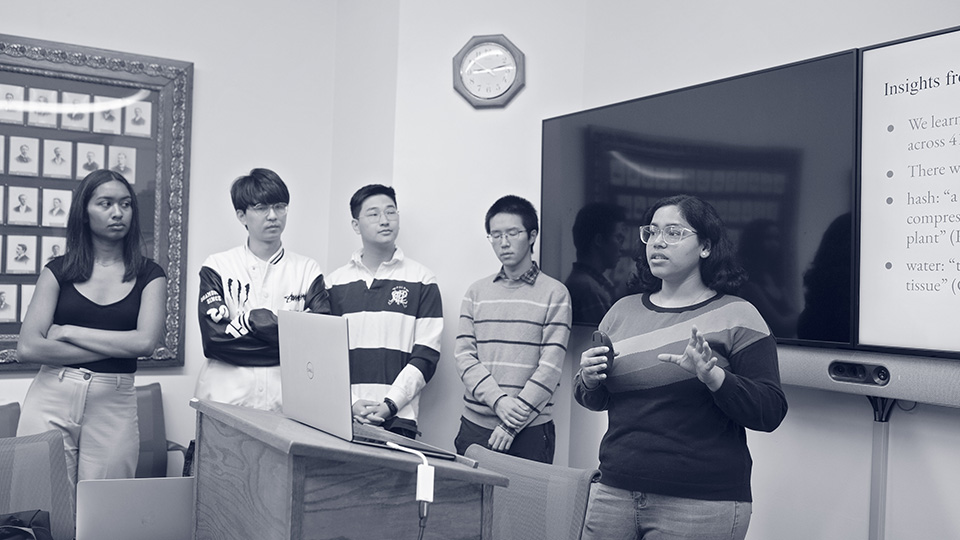Annual Report 2023

Impacts
Again in Fiscal Year 2023, more than 45 million people visited law.cornell.edu. They engaged in 73 million sessions and viewed 166 million pages of content.
More important than the raw traffic numbers, though, are the stories we hear from folks who use the LII:
“The Legal Information Institute is an incredibly valuable, free source. I use it frequently in my work as a reporter and editor. I have included links to the Institute’s explanations in my articles far more times than I ever could count.”
Rachel H., Editor and Publisher of a local news website
“[Y]our service has been invaluable to me for the past 30 years.”
Timothy P., appellate counsel
“This was an invaluable resource when I was teaching, and I still consult it in retirement. Thank you!”
Lea V., law professor emerita
“I’m very grateful to Cornell LII and its tireless staff for providing free and up-to-date access to the United States Code and the Federal Rules of Civil Procedure and the Federal Rules of Evidence, plus its US Supreme Court advance sheets provided under its Hermes Project. Many thanks.”
Stephen G., attorney
“I use your site with my students and it is invaluable. Thanks for your hard work.”
Dianna B., Ph.D, professor
“[P]roviding legal information to citizens, without pricing them out, is essential. A non-partisan, legal information-resource, available to all, is a huge step to having an informed, and empowered citizenry.”
Kurt G., skills trainer and case manager
“Thanks for making U.S. law accessible and for supporting global access to legal information!”
Mary H., law professor
“Been using these resources for almost 20 years!!!”
Maya D., attorney
“Thank you for always being there 24/7/365. Your site has helped more Veterans than you can ever know.”
Alex G., veterans advocate
“The work you do is very valuable to me as a non-lawyer/business owner and student of matters political/judicial. Thank you!”
Jonathan C., executive
“I use LII constantly in my work. Thank you for working to make the law accessible and open!”
Chase H., attorney
“I’ve used the comprehensive LII resources of statutory laws and regulations for decades and have found them to be indispensable to my practice. Keep up the great work you do!”
Mark D., tax attorney
“This is an enormously helpful free resource to those of us in grassroots community legal matters. Thank you.”
Paul J., advocate
Who entrusts us with their readers
We are proud to say that nonprofit organizations, educational institutions, news outlets, and all levels of government continued to extend their vote of confidence in our resources by sending us their readers. In the past year, we received referrals from large government agencies we’d expect like the IRS, VA and HUD, but also smaller ones like the Selective Service Board (pointing visitors to the 1991 Supreme Court case upholding the practice of registering only men for the draft), the Consumer Product Safety Commission (linking to various federal regulations in our CFR), and cio.gov (“a forum for Federal Chief Information Officers” who used our site to point to the US Code’s definition of Chief Data Officers). At the state level, agencies in Massachusetts, Texas, California, Indiana, and Oklahamoa had the top referring websites, though the city of Charlotte, NC was also high on the list. We also received traffic from respected organizations like the American Bar Association, Pro Publica, and the American Civil Liberties Union, as well as popular media outlets such as the New York Times, the Washington Post, NPR, CNN, MSNBC, and Fox News. Learning management platforms like Google Classroom, Blackboard, and Brightspace sent us traffic from hundreds of school districts, colleges and universities. Though these sorts of “referral links” make up a very small part of our overall traffic (less than 5% in the aggregate), we are proud of the trust in our work that they represent.
Global reach
Beyond the United States, LII welcomed visitors from across the world in 244 countries and territories. Although the ranking of traffic by country of origin does not change much from one year to the next, it shifted a bit in FY23: China moved back into sixth place behind the US, India, Philippines, Canada and the UK. Nigeria, which in last year’s report had climbed into the #10 slot, moved up to 8th with an impressive 29% increase in visitors. Russia made perhaps the most impressive jump, as 142% more visitors–close to a quarter million–came from there this year, vaulting it into the 10th spot.
Project Updates
As we celebrated our 30th anniversary of providing free legal resources online, it was particularly gratifying to see the collections in which we’re investing the most resources make huge gains in usage as we continue to help people everywhere find and understand the law through our unique multidisciplinary approach.

State regulations
Our state regulations collection, made possible by Public.Resource.Org’s multi-year Code Improvement Commission project, continues with the collaboration of LII, Fastcase, Inc., Justia, Inc., and others. In the past year, more people used this collection than ever before, as evidenced by a 54% increase over FY22. We relentlessly refine our tools for ingesting, processing, standardizing, enriching, and publishing the regulations of the 50 states in a user-friendly and accessible format, while maintaining access and timely updates for an audience that visited more than 6.3 million pages in this collection. Most importantly for our effort to improve the discoverability and readability of the regulations, we worked with two teams of M.Eng. students to explore new techniques to analyze and mine the text of the regulations for legally significant features (e.g., definitions) that are not marked up explicitly in the text. These applied research projects both leverage what we have learned from our prior work with federal regulations and enable us to take in a much broader range of drafting conventions among the many agencies across the 50 states. We look forward to bringing the resulting features to the public on the LII website in the coming months.
Supreme Court Bulletin
As always, the thirty-six Cornell Law students who researched, drafted, and edited our Supreme Court Bulletin Previews for the 2022 – 23 term provided the public with important analysis of the arguments made by the parties in every SCOTUS case. Unsurprisingly, the highest-profile cases yielded the most pageviews, with tens of thousands of people reading our students’ explanations of 303 Creative LLC v. Elenis, Students for Fair Admissions Inc. v. President & Fellows of Harvard College, and Counterman v. Colorado, along with others from the term such as Gonzales v. Google and Andy Warhol Foundation for the Visual Arts v. Goldsmith. The other half of our Bulletin service, where we immediately publish and circulate to subscribers all Supreme Court opinions from a direct feed from the court’s administrators, was also busy in Fiscal 23. As an interesting insight into how many news services now publish new opinions, as well as the progress the Supreme Court itself has made in publishing its own output, it’s worth noting that our most viewed opinion of FY23 was once again Roe v. Wade.
Wex
Fiscal ‘23 saw clear results from the emphasis we have placed in recent years on improving Wex, our collection of plain language explanations of legal terms and concepts. Our students have now revised or created around 5,000 Wex entries since this renovation initiative began in 2020. As a direct result, readers are finding Wex in much higher numbers than ever before. Wex usage in Fiscal ‘23 jumped to more than 25 million pageviews. The most popular Wex pages in that time were articles explaining the Second, and Fifth Amendments to the US Constitution, as well as the commerce clause, but also definitions of “contract,” “federalism,” “due process,” and “defamation.”
Women and Justice Collection
Our Women & Justice Collection (WJC), which saw a 34% increase in traffic over last fiscal year, continues to provide open access to legal resources related to gender justice from around the world. The first vetted and searchable database of its kind, the Collection hosts domestic, regional, and international caselaw, legislation, and other legal instruments. Each resource is accompanied by a plain-language, one-paragraph summary to help ensure that everyone can understand the laws that govern them. Student researchers edit summaries provided by pro bono law firm associates from two of the world’s largest law firms; translate summaries; and perform comparative law research for the Collection’s NGO partners. Project partners include the Democratic Governance & Rights Unit (DGRU) at the University of Cape Town and Cornell University’s Center on the Death Penalty Worldwide.
Collaboration
LII staff members continued to serve as a resource to the free access to law movement and legal technology projects, collaborating with a number of groups in government, non-profits, and industry—including the Government Publishing Office, the Center for Computer Aided Legal Instruction, and a range of startup companies. We continued to serve as a formal advisor to the National Science Foundation-funded project FAI: Using AI to Increase Fairness by Improving Access to Justice; and, two of our technologists with experience in legal informatics research continued their work with the FAI research team, exploring techniques and providing feedback on evaluation. We also maintained representation on the editorial boards of two journals: the Journal of Open Access to Law, and Law in Context, which “publishes socio-legal articles that explore the social, historical, economic, political, and technological aspects of the operation of law.”
Finances
LII remains exceedingly proud of all that it accomplishes without direct financial support from Cornell. As always, friends like you make that success possible. Our mix of advertising revenue on the website, funds from our project partners and collaborators, and gifts from thousands of website users like you each year allows us to increase public understanding of the law without ever charging anyone anything to find and read it.


